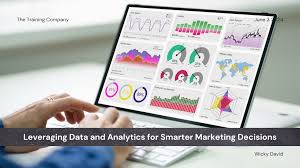Leveraging Analytics for Smarter Marketing Decisions
In the digital age, data is one of the most valuable assets a business can possess. However, data alone is not enough—it’s how you interpret and act on that data that truly drives success. This is where analytics come into play. By leveraging analytics, businesses can make smarter, data-driven marketing decisions that lead to better targeting, increased ROI, and overall growth. In this article, we’ll explore how to effectively use analytics to enhance your marketing strategies and achieve measurable results.
1. Understanding the Power of Analytics
Analytics refers to the process of collecting, processing, and analyzing data to uncover patterns, trends, and insights. In marketing, analytics allows businesses to understand customer behavior, track campaign performance, and identify opportunities for improvement. By turning raw data into actionable insights, businesses can make informed decisions that optimize their marketing efforts.
For example, by analyzing website traffic data, a company can determine which pages are most popular, how visitors are navigating the site, and where they are dropping off. This information can then be used to improve user experience, refine content strategies, and ultimately increase conversions.
2. Setting Clear Objectives
Before diving into analytics, it’s essential to establish clear marketing objectives. What do you want to achieve? Are you looking to increase brand awareness, drive more traffic to your website, or boost sales? Defining your goals upfront will help you determine which metrics to focus on and how to measure success.
For instance, if your goal is to increase website conversions, you might focus on metrics like conversion rate, bounce rate, and average session duration. On the other hand, if brand awareness is your primary objective, you may track metrics like social media engagement, reach, and impressions.
3. Utilizing the Right Tools
To effectively leverage analytics, you need the right tools. There are numerous analytics platforms available, each offering different features and capabilities. Google Analytics is one of the most popular tools, providing in-depth insights into website traffic, user behavior, and conversion tracking. Other tools like HubSpot, Adobe Analytics, and Kissmetrics offer additional features tailored to different marketing needs.
For social media analytics, platforms like Hootsuite, Buffer, and Sprout Social can help you track engagement, follower growth, and the performance of individual posts. Email marketing platforms like Mailchimp and Constant Contact offer built-in analytics to measure open rates, click-through rates, and overall campaign effectiveness.
4. Tracking Key Performance Indicators (KPIs)
Key Performance Indicators (KPIs) are the metrics that matter most to your business. They help you measure the success of your marketing efforts and determine whether you’re on track to meet your objectives. Common marketing KPIs include:
- Conversion Rate: The percentage of visitors who take a desired action (e.g., making a purchase, signing up for a newsletter).
- Customer Acquisition Cost (CAC): The total cost of acquiring a new customer, including marketing and sales expenses.
- Customer Lifetime Value (CLV): The total revenue you can expect from a customer over the course of their relationship with your business.
- Return on Investment (ROI): The profitability of your marketing efforts, calculated by dividing the net profit by the cost of the campaign.

- Bounce Rate: The percentage of visitors who leave your website after viewing only one page.
By regularly monitoring these KPIs, you can assess the effectiveness of your marketing strategies and make data-driven adjustments as needed.
5. Applying Predictive Analytics
Predictive analytics takes data analysis to the next level by using historical data to forecast future outcomes. This approach allows marketers to anticipate trends, understand customer behavior, and make proactive decisions that improve marketing performance.
For example, predictive analytics can help you identify which leads are most likely to convert into customers, enabling you to prioritize your sales efforts. It can also predict which products or services will be in high demand, allowing you to tailor your marketing campaigns accordingly.
6. A/B Testing and Optimization
A/B testing, also known as split testing, is a method of comparing two versions of a marketing asset (such as a webpage, email, or ad) to determine which one performs better. By testing different elements—such as headlines, images, or call-to-action buttons—you can identify what resonates most with your audience and optimize your campaigns for better results.
Analytics plays a crucial role in A/B testing by providing the data needed to evaluate the performance of each variant. Once you have determined the winning version, you can implement the changes across your marketing efforts, confident that they will drive better outcomes.
7. Making Data-Driven Decisions
The ultimate goal of leveraging analytics is to make smarter, data-driven decisions. Instead of relying on intuition or guesswork, data-driven marketing allows you to base your strategies on concrete evidence. This approach reduces risk, increases efficiency, and maximizes the impact of your marketing efforts.
For example, if analytics show that a particular marketing channel is driving the majority of your conversions, you can allocate more resources to that channel to capitalize on its success. Conversely, if a campaign is underperforming, analytics can help you pinpoint the issue and make the necessary adjustments.
Conclusion
Leveraging analytics is essential for any business looking to thrive in today’s data-driven world. By setting clear objectives, utilizing the right tools, tracking KPIs, and applying predictive analytics, you can gain valuable insights that inform your marketing strategies and drive better results. Remember, the key to success is not just collecting data but turning it into actionable insights that lead to smarter, more effective marketing decisions.
Whether you’re looking to optimize your current campaigns or develop new strategies, embracing analytics will empower your business to make informed decisions that deliver measurable growth.

